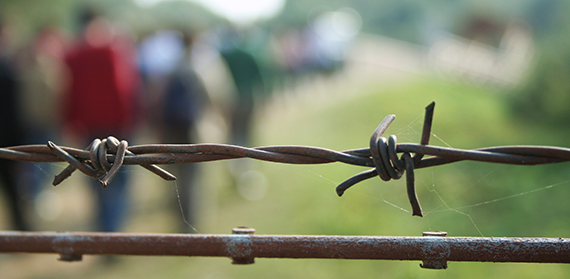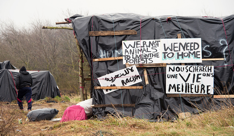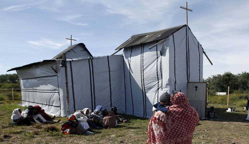by Dr Chris Shannahan, Research Fellow, Centre for Trust, Peace and Social Relations
We Are Not Locusts
A young man called Alpha from Mauritania lives in a makeshift hut in the overgrown area known as ‘the jungle’ near Calais. In response to David Cameron’s dismissal of such women and men as a ‘swarm’ Alpha told the BBC, ‘We are not locusts, we are human beings.’ A reflection that seems to have escaped the headline writers of some British newspapers like The Daily Express – ‘Send in the army to halt migrant invasion.’ [30/7/2015] and politicians like Philip Hammond [the Foreign Secretary] who told BBC News that, ‘Europe can’t preserve its standard of living if it has to absorb millions of migrants from Africa.’ Such assessments turn migrants from living breathing subjects into inanimate objects.
(image: independent.co.uk 3 September 2015)
When set alongside a process of cultural othering, such objectification can become a justification for policies intended to bolt the door on ‘fortress Europe’, making it easier to become blind to the harrowing image of a three year old toddler dressed in a red T-shirt and blue jeans lying dead on a beach in Bodrum. Other politicians, however, have sounded a more hospitable note. Possibly spurred on by the imaginative initiative in Iceland whereby 11,000 Icelanders offered to provide accommodation for asylum seekers in their home, the Labour Party leadership candidate Yvette Cooper has argued that the UK government should provide sanctuary for up to 10,000 asylum seekers rather than the current 200.
(image: ibtimes.co.uk 3 September 2015)
Myth Or Reality?
Tom Davies, Arshan Isakjee and Surinder Desi help us to distinguish myth from reality, reminding us of two overlooked facts – [1] most of the people who have made it across the Mediterranean during 2015 settled in Southern and Central Europe – only 3,000 are currently living in Calais [2] The language used by the media is misleading – Some of the people in ‘the jungle’ may be migrants but many are asylum seekers fleeing persecution. The inter-governmental International Organization for Migration helps to correct the impression of a ‘torrent of stowaway migrants head[ing] to the UK’ (Daily Express, 29th August 2015). 249,650 asylum seekers and migrants have been documented arriving in the entire European Union during 2015 and contrary to much media reporting in the UK, ‘…the number of Syrians reaching Europe is minimal in comparison to the 4 million refugees in Syria’s neighbouring states, such as Turkey, Lebanon and Jordan’ (IOM, 17 August 2015)
The Chapel In The ‘Jungle’ And Our Shared Humanity
The Hebrew and Christian scriptures speak a lot about ‘strangers’ – ‘Love the stranger as you love yourself for you were once strangers in Egypt’ [Leviticus 19:34] and again – ‘Show hospitality to strangers for by doing so some people have entertained angels unawares.’ [Hebrews 13:2] Luke Bretherton (2010, 148) sharpens such generalised epithets, ‘…the extension of solidarity is particular…the Good Samaritan responds to one he finds nearby, not some generalized ‘Other’.’
Amidst calls for more dogs and razor wire a ray of hope has emerged in the ‘jungle’. Christians, largely from the Horn of Africa, have built a makeshift church [mosques and a school have also been built]. The chapel in ‘the jungle’ has become a symbol of solidarity, reminding a secularising Europe of the ongoing social, cultural and existential significance of religious faith. It has enabled largely Orthodox Christians in the camp to fashion what Manuel Castells (2010, 9) calls a ‘resistance identity’ through which excluded people forge, ‘…forms of collective resistance against otherwise unbearable oppression.’ For the Christians praying in the ‘jungle’ the chapel exemplifies their conviction that Christ is present as a stranger amongst them and as one of them. On visiting Chapel in ‘the jungle’ with BBC’s ‘Songs of Praise’ (16th August 2015) the Anglican priest Giles Fraser referred to it as a ‘place of raw prayer and defiant hope.’ The broadcast was castigated by some newspapers (The Daily Mail and The Daily Express) but reported in affirming terms in The Independent and The Daily Telegraph.
(image: independent.co.uk 3 September 2015)
Our Shared Humanity
Calais challenges us to recall our shared humanity. Nick Cohen suggests that ‘If you hate the migrants you hate yourself.’ In denying the humanity of the women and men in Calais we diminish our own humanity and turn our backs not only on our interwoven world but on our better selves. An acknowledgement of our shared humanity in this interconnected fragile age combined with a commitment to what Paul Gilroy (2004) has called ‘planetary humanism’ can perhaps begin to draw the poison from toxic debates about migration, multiculturalism and our common future. The figure of Jesus who is so central to the lives of the Christians worshipping the Chapel in the ‘jungle’ challenges us all, whether we be people of faith or not, ‘When I was hungry you fed me. When I was naked you clothed me. When I was homeless you gave me a room.’ [Matthew 25]. What does it mean to be human and be humane in our interconnected but fractured century? Perhaps the Chapel in ‘jungle’ can provide us with the momentum to respond.







Comments are disabled